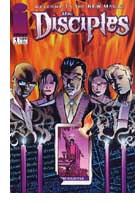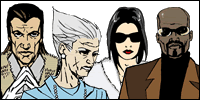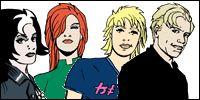
THE DISCIPLES, a new comic series from Image, follows the trials of a group of magicians who, drawn from various magical disciplines, are brought together to combat the forces of evil - with unpredictable results. The first two issues have already seen half of a Hong Kong city blown up, a young girl 'awakening' to her magical powers... and a group of magicians bickering like children.
"They don't always get on," smiles co-writer Chris Dows, "And they don't always win. But they are on the side of right... mostly."
Chris Dows and Colin Clayton have been working together for over ten years. It was Clayton's suggestion that they collaborate, after Dows had "a less than satisfactory experience" re-writing a film script for Channel 4. They started out working for Malibu Comics on DEEP SPACE NINE, and various English licensed properties. Then, in 1995, a story in NEGATIVE BURN saw the start of their long relationship with Caliber Comics, which also included AUTUMN, a gothic story illustrated by German artist Horus Odenthal.
 The gothic atmosphere always conjures the potential of magic in comics - and magic is one thing both writers deem influential. "My interest goes back quite a way," explains Dows, "We live in Grimsby, on the East coast of England, and the place has a long history connected with druidism and pagan worship. Some pubs in Grimsby still openly practice a number of barbaric rituals... especially at closing time."
The gothic atmosphere always conjures the potential of magic in comics - and magic is one thing both writers deem influential. "My interest goes back quite a way," explains Dows, "We live in Grimsby, on the East coast of England, and the place has a long history connected with druidism and pagan worship. Some pubs in Grimsby still openly practice a number of barbaric rituals... especially at closing time."
"I've been dabbling ever since I read SUB MARINER #22," says Clayton, "The issue where Doc Strange is rising out of the grave behind Namor. I've been trying to summon the Nameless Ones ever since."
On a more serious note, Dows continues: "I've dabbled in everything over the years, but more recently I've practised Chaos magic and Voodoo to a lesser extent. Sure, some of it is smoke and mirrors, some of it is based on suggestion and fear, and some of it is complete rubbish. But some of it works. It's that part which bothers, excites and disturbs me. It's 90% bollocks and 10% real. Most of the time you don't need the ceremony and ritual; that's just to set the mood.
"The UK has been the seat of innovative magic for a long time, with the 20th Century introducing some of the major players: Austin Osman Spare, Aleister Crowley and Peter Carroll to name a very few. But the problem magic has here is the same as everywhere else - all the media are bothered about are a few well-intentioned druids at Stonehenge for the Summer Solstice. Magic is not a soundbite, a convenient packaged segment. It's a belief and a way of life."
'Some magic works. It's that part which bothers, excites and disturbs me.' Accordingly, magic permeates the very structure of THE DISCIPLES, a twenty-two issue series in which each book is based on one of the Tarot's Major Arcana. And, promises Dows, "It's a book where you're going to see a lot of things which have never been seen in comics before. Especially the ending."
The original idea for the series, however, didn't come from Dows or Clayton. Instead it came from Gary Reed, a former editor of Caliber Comics.
"Gary approached us at the 1997 Chicago Convention," says Dows. "He presented the idea, and a few of the characters, and asked us what we could do with it - so we stripped it down, made a few changes and built it back up to what you see today. It was originally scheduled as a Caliber book. At the time Clayton and I had just finished THE SEARCHERS for Caliber, and the magnificent artist Laurence Campbell - a fellow Brit - was also working for them. Together we produced the first two issues of THE DISCIPLES in 1998... and they didn't publish it."
Instead, Reed (now ex-Caliber) pitched the book to Image last year, and is still involved as editor. How does this work in practice, as the book was originally his creation? "Gary trusted us from the beginning to make it 'ours'. He doesn't interfere, but at the same time he knows what is good for the book and the team. Because it's not just us - it's Laurence [Campbell, penciller], Larry [Shuput, inker], Jon [Proctor, colorist], Nate [Pride, letterer] and Gary. We all have an obligation to work as part of that team."
There's also a team within a team, with Dows and Clayton sharing writing credits. The practice is quite unusual in comics these days, so how does this work for them?
 "We've always worked on books together, so it never seems unusual to us," says Dows. "We come up with ideas separately and thrash them out, going from initial concept to story springboard, through full synopsis to final script, losing or gaining stuff as we go on. We do argue about plot points, character traits or dialogue - but nothing goes in a script which we aren't both happy with. This means that sometimes we spend hours arguing over a word, and other times we write six pages in a session. It's important to be flexible when you're working with a lot of characters, but at the same time you need to have a clear idea of who they are and where they are going. Colin and I pride ourselves in knowing just who our characters are, and we hope that comes through in the storytelling."
"We've always worked on books together, so it never seems unusual to us," says Dows. "We come up with ideas separately and thrash them out, going from initial concept to story springboard, through full synopsis to final script, losing or gaining stuff as we go on. We do argue about plot points, character traits or dialogue - but nothing goes in a script which we aren't both happy with. This means that sometimes we spend hours arguing over a word, and other times we write six pages in a session. It's important to be flexible when you're working with a lot of characters, but at the same time you need to have a clear idea of who they are and where they are going. Colin and I pride ourselves in knowing just who our characters are, and we hope that comes through in the storytelling."
Dows goes on to explain the process of putting the book together, and points out how important this teamwork is: "Laurence adds so much to the look and feel of the characters, and the book as a whole. We work very closely with him when we write the scripts, which are fairly detailed. If Laurence thinks a certain panel should be altered, we don't argue because we know he's right, and we know he trusts us. We think the care we take shows in the pages. Larry adds more with his inks, Jon finishes the effect with his beautiful colours and Nate does a great job with the lettering. We have individual tasks, but our personal strengths are put to their best uses without treading on one another's toes."
Given the theme of the book, is THE DISCIPLES more than just a straightforward tale of good versus evil? "Complications arise in how you define 'good' and 'bad'," says Dows. "Our bad guys do some nasty things, but so do our heroes - its all relative. What we want to avoid is a 'villain of the week' feel. Sure, there's a permanent bad guy in the form of the Valetta Corporation, but they don't have to be there all the time. The Disciples, as individuals, have a hell of a lot more to contend with."
Clayton is more specific: "It's not going to be as simple as good versus evil. Like all good villains, Valetta think they're doing the best for the world - like Dr Doom, who thinks his tyrannical rule is beneficial for his people."
The Disciples are brought together by a mysterious elderly woman called simply 'Mother'. It's implied that she is linked to the planet, and may be a representation of the earth. Is this allegorical?
"Mother is definitely a Gaia figure," hints Clayton. "Although whether allegorical or literal... I think we'll have to wait and see."
So are the Disciples concerned with the magical defence of the planet?
"It's more defence of our plane of existence," says Dows. "We're working on more than one level here. Mother is a representation of Earth magic, but like all good magic it's down to interpretation. We don't want to appear clumsy with the characters' skills and traits, but we had to pin some handles on them to define them as people. So don't take Mother too literally. But her actions aren't far from the truth we're trying to represent through her."
Given their general interest in magic, the writers made a deliberate effort to have each Disciple belong to a different faction of modern mysticism.
'Much of the positive feedback is about the accuracy of the schools we portray.' "It's a chance to bring to light different kinds of magic and stand them side by side," explains Dows. "We don't try to compare them - they all have their strengths and weaknesses, and their powers are not absolute. But it gives us a chance to get into areas we've been interested in for years, and use the characters to show what magic can be. We make assumptions in the book that the reader has to accept, such as 'magic works,' but we don't think we're asking too much. Much of the positive feedback we've had from readers is about the accuracy of the different schools we portray, and that's a huge compliment.
"We've used the major magical 'schools' as we wanted to look at all the major belief systems centring around magic. As the series progresses we'll also be looking at some of the smaller and more ancient schools, such as the Middle East."
There certainly seems to be some tension between the members who practice older, more traditional styles of magic and those who practice the newer styles, like Chaos Magic.
"That was a deliberate juxtaposition," says Dows. "We felt it would arise from a kind of magical mistrust and snobbery that occurs in just about every specialist field you can think of. Surgeons don't rate GPs, GPs don't rate chiropractors, hardware computer specialists don't rate software developers... We felt it would be the same for 'old' and 'new' magic."
'Real' magic is very prominent in comics at the moment. THE INVISIBLES is steeped in modern magical thought - through the letter column Grant Morrison taught his readers how to perform sigil magic and told them all about Spare, Caroll and Phil Hine. Alan Moore, meanwhile, is essentially writing a magical manual in PROMETHEA. Is the comic medium a good one for communicating ideas about magic, and to show its effects?
"A lot of the people writing comics now were reading in the late '60s and early '70s," explains Dows, "A time of adjusted consciousness - which was reflected in the druggy, trippy comics of the time. People like Alan Moore and Grant Morrison are just updating that whole '60s magic scene."
He continues, "I love the freedom that comics gives you. There's just about no other medium left that allows a creator to put exactly what they want to see in front of the audience in such unmolested detail as comics do. If this means that avenues not open in other mediums force writers to use comics to express and explore their ideas, then good. Comics are a great way to tell a story, define characters, and show spectacular events and situations. I think a lot of good writers, not just comic book writers, should look to the medium and use its huge advantages more."
'The Templars were the Microsoft of the middle ages.' Another hint at 'real' magic lies in the Disciples' opponents, the forementioned Valetta Corporation. Though it hasn't been stated, they appear to be descended from the Knights Templar; the Templar Cross features heavily in the artwork whenever these antagonists are on the page. What does this mean?
"The Templars freak me out," says Dows. "They always have. When I was on honeymoon in Malta, I picked up the 'Templar Vibe' and realised just how massively powerful they were. They were the Microsoft of the Middle Ages - the Church, military and Wall Street all rolled into one. A holiday to Rhodes two years ago spooked me out even more, because I didn't realise they left Rhodes to go to Malta - and left some fabulous monuments behind them. Templar history is very close to the Roman Empire in its stages. Magnificent at first, but so riddled with evil and corruption that it imploded through its own actions. Extrapolating the Templars into modern day society was easy. If you believe what you read about the Masons and so on, it all makes a lot of sense..."
 Image's way of working affords the creators an unprecendented amount of freedom - and offers flexibility when a book is not an 'instant hit'. This has caused a slight change of direction for the book's publishing method, as Dows explains:
Image's way of working affords the creators an unprecendented amount of freedom - and offers flexibility when a book is not an 'instant hit'. This has caused a slight change of direction for the book's publishing method, as Dows explains:
"Basically, we're not seeing the sales we hoped for, so we're taking a chance on the next issue. Issue #3 has now been'cancelled', and we're going to roll #3 and#4 into one, double-sized issue which will be solicited in October. We hope that this will bring a lot of new readers on board, so that we can carry on telling our story in the way we want to."
So, is THE DISCIPLES a good book for someone who enjoys comics such as THE INVISIBLES, PROMETHEA and HELLBLAZER?
"Everyone should buy the book!" Dows laughs. "It's not just for people interested in magic or the occult - there's something for just about everyone. One reader said it was like X-MEN, with magic instead of super powers, which is pretty cool."
Their message to anyone who hasn't yet picked up THE DISCIPLES is simple: "You should buy it because it's a challenge; it doesn't give you fun on a plate, and you'll have to think a bit. There are characters who are good, characters who are sexy, and characters who are downright nasty pieces of work.
"Someone said it gave them that special feeling you get when you've just walked out the cinema after seeing a really great movie," concludes Dows. "That's why you should read it."
The official DISCIPLES website can be found at www.arcanamajor.com.
This article is Ideological Freeware. The author grants permission for its reproduction and redistribution by private individuals on condition that the author and source of the article are clearly shown, no charge is made, and the whole article is reproduced intact, including this notice.


